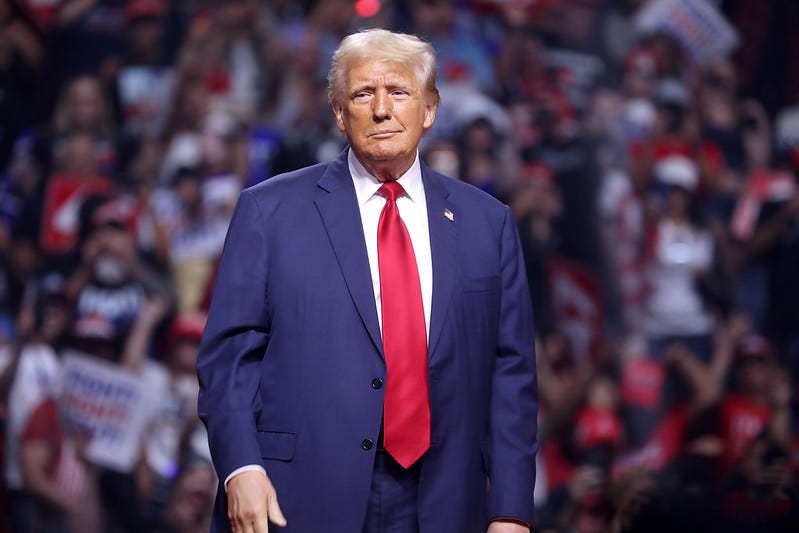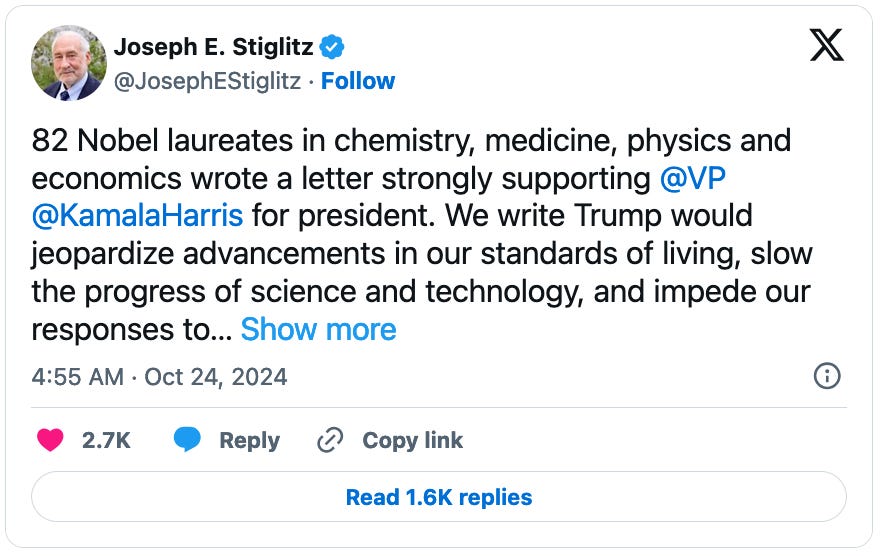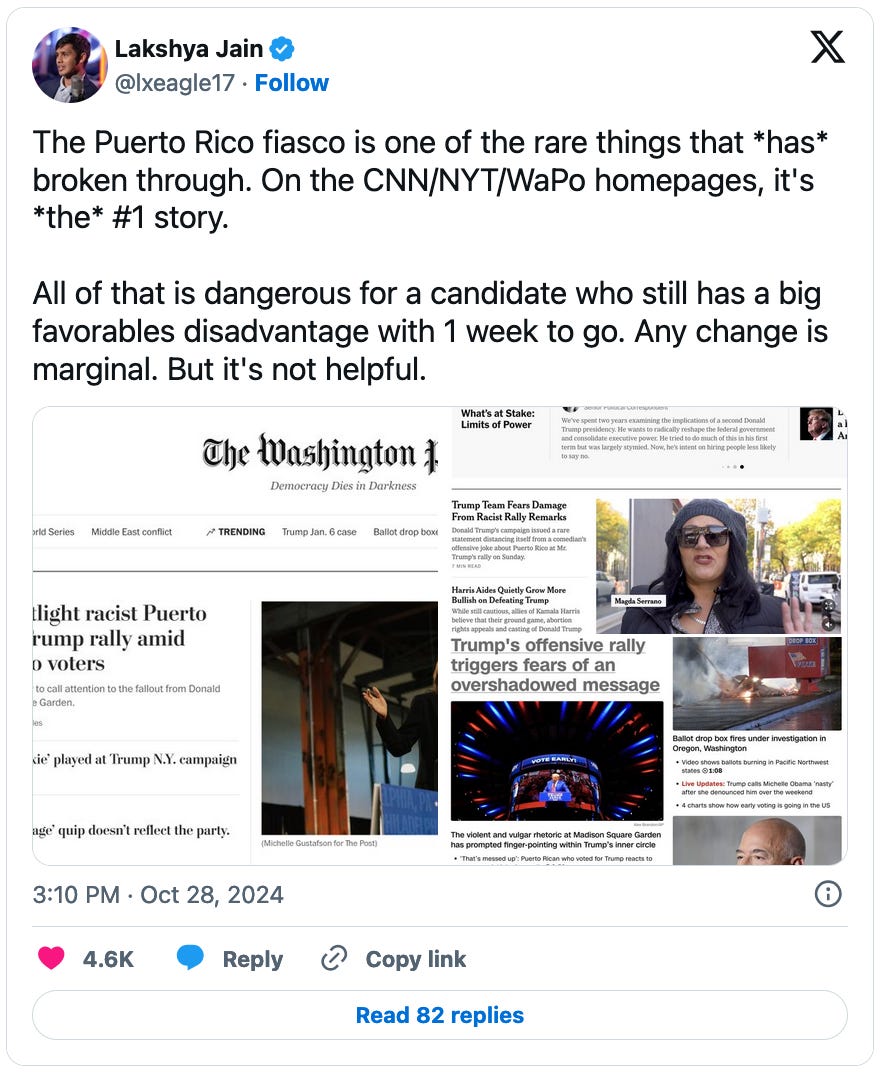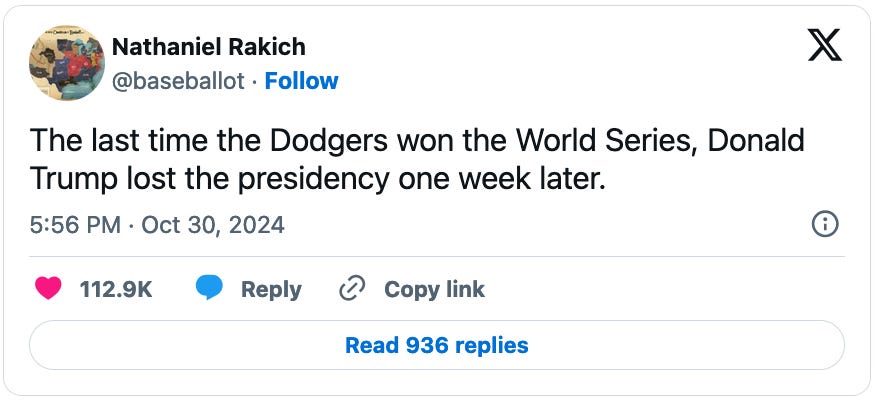
Donald Trump will need to get a higher share of votes in swing states than he’s ever had before to win this year. While the polls are close, I don’t think support for him has grown.
The polls are close, but that doesn’t necessarily mean the election will be close. At most it means that a close election is the median outcome and that either candidate is about equally likely to win. But while polls are generally our best indicators of how voters will vote, the actual vote normally differs from the polls significantly. The New York Times found that between 1998 and 2020 the final margin differed from the margin of the national polling aggregate by an average of 2.3 points. That difference isn’t surprising. Sampling voter intentions is an imperfect way of estimating how voters will ultimately vote. So in fact it’s likely the election won’t actually be that close; there’s a good chance one side outperforms expectations across the swing states and wins the electoral vote handily.
But polls are also not the only information we have. Donald Trump has run for president twice before. He managed to beat Hillary Clinton in 2016 when more than 5% of the vote went to independent or third party candidates, but he has never managed to win more than 47% of the national popular vote. Because this election is likely to be more like 2020—when less than 2% of the vote went to independent or third party candidates—than 2016, Trump will probably have to get more than 47% to win. Since more than a half of Americans have an unfavorable opinion of Trump, that may be hard for him to do. In 2020, no candidate won a state while winning less than 49.3% of the vote or lost a state while winning more than 49.3% of the vote. That’s likely to be roughly the finish line presidential candidates will have to cross to win this year too. Trump wasn’t able to win 49% of the vote in Nevada, Michigan, Pennsylvania, or Wisconsin in either of his two previous campaigns, and he’s polling at less than 48% in those states this year. It will be hard for him to win without winning at least one of those states.
Going by the polls alone, it’s certainly possible Trump could win one or all of them. The polls could be underestimating his support the way they did in 2020, in spite of pollsters’ efforts to make sure they don’t repeat their mistakes. Normally, the party out of power has an advantage when Americans are unhappy with the direction of the country. But his presence in American politics is at least one of the reasons Americans are unhappy with how things have been going. Democrats have dominated statewide elections in those states in recent elections, and I’m skeptical Trump’s support has grown significantly. Kamala Harris has dramatically outraised him with small dollar donors.
Trump made his closing pitch at a Madison Square Garden rally that the New York Times called “a carnival of grievances, misogyny and racism.” Trump reiterated his promise to “launch the largest deportation program in American history.” One speaker compared Harris to a prostitute and called her “the Antichrist” and “the Devil.” Tucker Carlson described her as “Samoan-Malaysian”—she is neither ethnically Samoan nor Malaysian—for some reason. Another speaker said that the people in the Democratic Party were all “degenerates, low-lives, Jew-haters.” Stephen Miller invoked a Ku Klux Klan slogan by declaring that “America is for Americans and Americans only.” Comedian Tony Hinchcliffe—in case you had any doubts about what Miller meant—had already warmed up the crowd by saying Latinos “love making babies” because “they come inside, just like they did our country,” joking about a black person carving watermelons for Halloween, suggesting Palestinians like to throw rocks and Jews love money, and comparing Puerto Rico to “a floating island of garbage.”
The racism is part of a deliberate strategy, although Republicans would probably like to take some of those comments back. As Seth Masket says, the Trump campaign seems to believe that mainstream Republicans who are uncomfortable with overt racism will vote for him anyway—that they are actually his reliable base—and that he needs to inspire low-propensity extremists. They may be right, but this racist messaging will also galvanize other voters to vote against Trump. Calling Puerto Rico “garbage” particularly struck a nerve. There are nearly 6 million stateside Puerto Ricans, with sizable Puerto Rican populations in key states. After the clip of Hinchcliffe insulting Puerto Rico went viral, Puerto Rican superstars Bad Bunny and Jennifer Lopez shared Harris’s plan for Puerto Rico on social media. El Nuevo Día, Puerto Rico’s largest paper, published a blistering editorial calling for Puerto Ricans to vote for Harris. On The View, Ana Navarro-Cárdenas enjoined Puerto Ricans “to vote your heritage and your traditions and your identity.” Ricky Martin posted the Hinchcliffe clip with the comment, “This is what they think of us.”
My guess is this extremist strategy will backfire. I certainly may be biased, since I oppose Trump so strongly that it’s sometimes difficult for me to conceive we’d elect him again. But for all the fervor Trump inspires in his supporters, he is extremely unpopular with the broader population. He lost as an incumbent in 2020, and Republicans have underperformed fundamentals in every election since then. Against Trump, I think Harris will win the national popular vote by more than 3 points and will win at least 276 votes, although Republicans will claim Democrats cheated in every swing state she wins. The House will probably go the same way as the Presidency, with Democrats winning control by a small margin. But Democrats will probably fall short of retaining control of the Senate because they have to defend seats in Ohio and Montana. If Harris wins, I think it will be in large part because a significant number of women who are registered Republican or who have voted Republican in the past will turn out to vote for her. Puerto Rican voters could also turn out to be the difference in a swing state. I certainly hope I’m right, so that we can—to use Harris’ words—finally “turn the page on the fear and the divisiveness that have characterized our politics for a decade because of Donald Trump.”
My Forecasts
64% chance Kamala Harris wins the presidency
60% chance Democrats win control of the House
20% chance Democrats win control of the Senate
31% chance Republicans win a trifecta (the Presidency, the House, and the Senate)
19% chance Democrats win a trifecta (the Presidency, the House, and the Senate)
You can see my predictions and add your own on Fatebook here.
We’ll find out if I’m right soon enough. I’ve already voted, so I plan to spend Election Day avoiding the news with a shelter dog. Telling the Future depends entirely on reader support, so if you can please consider becoming a paid subscriber. And if you enjoyed this, please share it widely!






I have to go with Nate Silver's model, forecasting 53.8% for Trump (though just 25.7% for popular vote). I perceive you as having a greater pro-blue bias than Nate, and of course, a dramatically less detailed model.
You're basically reasoning about what the electorate "really" thinks, but I would guess that if your model is halfway-decent at understanding the electoral college, and if you shift it by roughly 1% of Americans (in swing states), then the probability ends up looking pretty much like Nate's.
And I notice that what you haven't done here is explain why ~47% of voters *did* vote for Trump in the past. I think if you don't have a solid, visceral understanding of why people vote for Trump (or, for that matter, against Harris or Hillary), then you'll probably get the vibes wrong and perform worse than a quantitative model like Nate's.
To me, the worst thing about Trump is that he lies and bullshits constantly, with his criminal behavior and total immorality a close second. The thing is, most voters (who have ever considered voting for him) have either never really believed that he lies and bullshits constantly, or, at least, distrust the "establishment" so deeply that it seems like Trump/Harris are almost equally bad. The reason Trump was so popular right off the gate in 2016, I believe, is that most of his lies were already popular memes on Facebook. He could simply take whatever nonsense he saw on Facebook or Twitter at face value and repeat it as gospel truth, and this made him seem very trustworthy to conservatives because that's what most conservatives were already doing. He outperformed other conservatives because he wasn't in one of the usual high-brow conservative clubs, he was in a low-brow "Facebook conservative" club like most of the primary voters were.
Even if, for example, voters understand that his claims of innocence are self-serving and therefore give those little weight, once Trump became nominee in 2016, a huge entire media ecosystem pivoted to convincing people that whatever Trump said was true ― no matter what it was. I noticed this starting with the "big groups of Muslims in New Jersey really did cheer 9/11" of 2016, and I assume this has continued with "the election was stolen" in 2020 and "trials against me are a witch hunt" of 2024. I haven't paid much attention to that ecosystem, but I noticed it a little after "they's eating the dogs, they're eating the cats, they're eating the pets of the people that live there". Trump doubled down, so conservative media either doubled down too, or looked the other way.
Hell, do you ever see people bother to mention that Trump's favorite phrase "fake news" was originally the term used to describe the Macedonians writing completely fake pro-Trump anti-Hillary "news articles" to earn ad revenue (in an article that IIRC was published on election day 2016 or the day after)? It seemed to me like Trump had won control of that phrase within two weeks, just by nakedly accusing the mainstream media of "fake news" with zero evidence. This reflects a broader strategy of people like Trump: take whatever you're accused of and throw it at your opponents. Suppose Trump kills a Democrat by appointing a series of pro-Trump generals, colonels and sergeants and giving the order―an act for which he'd be immune from criminal prosecution, as you know. I don't really think he'd do it, but if he wanted to, he might start Putin-style, by seeding stories about all kinds of imaginary plots by Democrats to kill Republicans. If by chance an important Republican should die of natural causes, Trump would immediately launch an investigation into the "foul play". By the time he assassinates the Democrat, then, it all seems like a wash, with Trump looking no worse than those "killer Democrats".
To be clear, the fundamental problem here is epistemology: most people's is terrible. Even on LessWrong, when I proposed a grassroots web site for hashing out the truth based on evidence[1], it got a cool reception. One commenter repeated Russian propaganda; another disagreed that truthseeking was difficult, saying 'To be clear, I'm saying that [true claims inherently "sound better" than false claims]': my proposal was unnecessary because this person believed they could tell whether a claim was true just by _reading it_.
And on the flip side, Matt Yglesias and Nate Silver have done a good job of highlighting the weaknesses of liberals and the Harris campaign relative to conservatives, e.g. conservative media tends to have the pragmatism not to talk about their pro-billionaire anti-health-care anti-abortion stances, while Harris hasn't really explained how her views apparently changed since 2019 (so the changes may seem insincere) and liberal groups will often blast Biden/Harris for having views they don't like, even when Trump is even worse. (And why wasn't Josh Shapiro nominated as VP?) Scott Alexander, too, recently endorsed Harris but highlighted things he *really* didn't like about liberals and "woke" Democrats, and it's pretty obvious that those sentiments aren't unusual in the general public. So given all this, a Trump victory would not be surprising.
[1] https://www.lesswrong.com/posts/9KAskejZdhskyriHk/let-s-make-the-truth-easier-to-find
The effects of post-Covid sticker shock cannot be underestimated. It has gotten incumbents of every political stripe kicked out in national elections worldwide by a wave of otherwise unlikely voters and this is also going to happen in the US. And the scary thing is, so many people on the Democratic side (and pollsters) are not accounting for this effect at all.
Please encourage people to get out the vote.